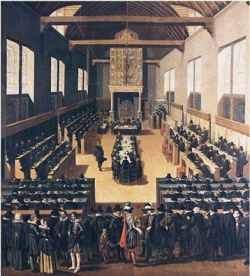The Canons of Dort, First Head of Doctrine, Rejection of Errors, Paragraph Eight
 Thursday, June 5, 2008 at 02:41PM
Thursday, June 5, 2008 at 02:41PM  Synod condemns the error of those . . .
Synod condemns the error of those . . .
VIII Who teach that it was not on the basis of his just will alone that God decided to leave anyone in the fall of Adam and in the common state of sin and condemnation or to pass anyone by in the imparting of grace necessary for faith and conversion.
For these words stand fast: He has mercy on whom he wishes, and he hardens whom he wishes (Rom. 9:18). And also: To you it has been given to know the secrets of the kingdom of heaven, but to them it has not been given (Matt. 13:11). Likewise: I give glory to you, Father, Lord of heaven and earth, that you have hidden these things from the wise and understanding, and have revealed them to little children; yes, Father, because that was your pleasure (Matt. 11:25_26).
________________________________________
The error identified and refuted in paragraph eight is one which attempts to locate reprobation in people’s misuse of their freedom, not in the sovereign will of God. According to this error, people somehow manage to reprobate themselves, by using their free will in such a way as to disqualify themselves from that which they could have otherwise obtained–salvation from sin. In other words, these people could have co-operated with God’s grace, and then believed the gospel. Instead, they “chose poorly,” as someone once put it.
This erroneous notion results from the Arminian contention that despite the fall of the human race into sin, men and women are still able to co-operate with the grace of God, and when they do so, they are thereby inclined to believe, repent, and live in holiness before God. When the logic of the Arminian view is applied to those whom do not chose co-operate with God’s grace (the reprobate), the reason given as to why these people are not numbered among the elect is because they did not chose to believe, repent, and live a holy life before God. To put it crudely, they reprobated themselves by not co-operating with grace.
As stated previously in the Canons, there are three reasons why people are numbered among the reprobate. First, God does not chose all to receive eternal life, and the reprobate are left “in the common misery into which, by their own fault, they have plunged themselves.” Second, God does not “grant them saving faith and the grace of conversion,” meaning that he leaves them in the same condition in which they are in Adam (fallen). Third, God will “eternally punish them (having been left in their own ways and under his just judgment), not only for their unbelief but also for all their other sins, in order to display his justice.”
This means that the reason why God does not choose them is to magnify his justice, and not because the sinner does something to reprobate themselves. Those who are numbered among the reprobate were already dead and sin and under the just condemnation of God. They are deserving of whatever judgment God determines will be meted out upon them. They are reprobated by God, because he decrees not to deliver them from their fallen condition. They are punished because of their participation in Adam’s sin, and for their actual sins. Those whom God determines not to choose, receive divine justice–which they deserve–not mercy, which ultimately stems from God’s gracious nature and mysterious purposes.
The authors of the Canons respond to this Arminian error by simply citing the biblical text which speak to this: “He has mercy on whom he wishes, and he hardens whom he wishes (Rom. 9:18). And also: To you it has been given to know the secrets of the kingdom of heaven, but to them it has not been given (Matt. 13:11). Likewise: I give glory to you, Father, Lord of heaven and earth, that you have hidden these things from the wise and understanding, and have revealed them to little children; yes, Father, because that was your pleasure (Matt. 11:25-26).”


Reader Comments (1)
Today's modern "Christianity" assumes that we all deserve mercy, and accuses God of not providing it fairly if He chooses only some of mankind.